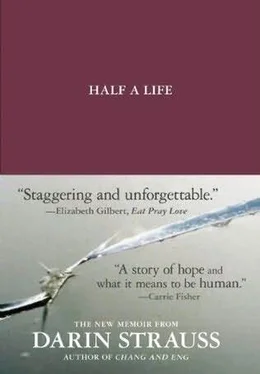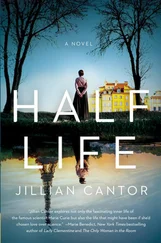It never occurred to me to petition for antidepressants or sign myself in for another psychotherapy go-round. I knew what was troubling me. Depression as a chemical shortcoming, a chronic formless mope, could be handled: a pill could gather it and sink it down its hole. But for what seemed an appropriate response to a problem that couldn’t be fixed — that sort of depression struck me as without cure.
And without much choice, I made sure that another potential cure wasn’t available. No friend could cheer me, could talk me out of anything. The people I lived with and ate with at college didn’t know. No one who encountered me in classrooms, at a frat party, in the campus center, noticed the fierce inner battles I’d fought to make the different Darins into a Darin that friends could recognize. Coming back to my room, I always worked up a cheerful face — abstracted but busy. What if someone had said, “Hey, is something wrong?”
I didn’t know the right answer, and didn’t have confidence in how I’d respond.
So I quietly indulged in the self-pity that, in the venerable tradition of sad people everywhere, I felt entitled to.
I began college under-read. Bookishness, rigorous thought, affection for time-consuming study — my public high school hadn’t prepared me for any of it. Besides, until Celine I’d been a lazy student, an underachiever. But somehow freshman year, a faked understanding — a rarefied reference, a split-second attempt to scale the tower — got me through. Oh yes, that’s so right, and wasn’t it Kafka who said …? Gibberish, bullshit. But I felt I had to look smart enough for two. (Not necessarily to be smart enough. It was still largely about appearances, still largely social.)
Freshman year, I took a “Death & Dying” class. Generous helpings of Elisabeth Kübler-Ross, side plates of When Bad Things Happen to Good People , and other softbrained texts — solemn, whispering titles like “Meditations.” I believed I could depend on a professor — student privilege, so I went ahead and wrote my midterm about the accident. A lot of the coursebooks had line-drawn covers showing pine trees or lonely outcroppings of rocks. The grad student who ran this touchy-feely seminar urged me to nose around, to “check out Celine’s side of things.”
I thought nosing around was a terrible idea. ( Everybody can master a grief but those who have it was a Shakespeare line I circled during a survey class.) But I was an obedient student. I had become, after leaving Glen Head, accommodating of any rule; I’d had to become less like a chance-taker who might have once been involved in an accident.
So I falteringly did what the grad student had asked. I grubbed up addresses, wrote letters, rooted out old phone numbers, butted into lives: the other bicyclist from that morning, a girl Celine had played field hockey with, a chem-lab partner — anyone I could trace down from her world.
I learned that Celine had remade herself in the months before her death. She had become a born-again. And once I found my way to her field-hockey friend, I discovered something that for years changed how I felt about Celine’s death.
Our phone chat was short and intense:
“I’m really really sorry to call like this. Because, well—” Immediately I was thrashing around. Talking too fast, explaining too much. “Because I sort of, I’m taking this class and need to find out more about, you know, her . Because of the class and the class leaders thought one really helpful thing might be to—”
“Wasn’t that diary thing weird?” the girl said.
What diary thing?
“Oh,” the girl said. She’d overstepped. “I guess I assumed you knew.”
I could feel my heart, its sudden and loud lubdub , blood lurching through the aorta.
“So you don’t know?” she said.
Celine had written, right before the crash, something to the effect of: “Today I realized that I am going to die.” It had been her mother who told this field-hockey friend about it.
“Thank you,” I said, and hung up. I may even have said it again, after laying the phone down. It was like a pressure along every part of my body had been snipped away: cut ropes flinging out crazily, weights tumbling from arms, shoulders, head. Today I realized that I am going to die . They were just eight words. I’d already grabbed them for dear life.
Celine, I decided, had died on purpose. That’s why she’d turned right in front of my car. (From what I understood, her family hadn’t been much invested in religion, and that’s why that born-again stuff not only came as a surprise, but actually had struck me as dispositive, somehow.) For me, the suicide note — or, rather, the hypothetically suicidal journal entry — settled it.
The first trial deposition came when I’d been away at college for a month. I caught a Greyhound home, and then Dad and I ambled over to the Nassau County courthouse, positive that this whole thing was a formality, that the Zilkes hadn’t really decided to come after me. That they still maintained — as everyone did — I wasn’t at fault.
(I don’t know how the letter summoning me to the courthouse wasn’t a dead giveaway. I guess that’s how naïve I was.)
At the courthouse, Dad and I met the lawyer my insurance company had detailed to us: curly hair, wireframe glasses. This was on Mineola’s Franklin Avenue, behind a grove of telephone poles. The lawyer and I shook hands, and above his soft grip his face was pale and serious. This was not the face of mere formality. As he hurried us down the lobby (lights and footsteps spanking off the marble floor), he told me I was being “litigated against.” Wait, the Zilkes are coming after me? In the flurry of information, I didn’t catch the guy’s name. Why would they sue me, after their promise? It wasn’t until the elevator doors shut that I felt control over my features and bodily functions return.
My dad and I followed the lawyer into a room in the lower floors. And here the lawyer divulged the cruel, galactic sum the Zilkes could get from me if the trial went horribly wrong. (It was beyond what the insurance company even covered; it was more money, I was sure, than I would ever have.) The low-ceilinged place we entered was called a Special Hearings room. I had to recalibrate myself again: Mr. Zilke sat about ten feet from me.
All at once I could see him bringing me that iced tea in his front room. And now he wouldn’t look me in the eye.
I’d imagined this deposition would take place in a judge’s cozy chambers — polished wooden desk; a sort of brass-based, green, LA Law -ish lamp. Instead we’d all sidled one-by-one into this chalky and hideously lit sub-basementy place. A long plastic table commandeered most of the room.
“You okay?” my father asked me.
“Yeah,” I said. I raised my chin, spoke confidently, and meant it. “Yes.”
And as fast as that, under the burnished presence of a judge, the event began. Right away the Zilkes’ lawyer trained his expertise on me. How far did her body fly?
Before I opened my mouth, I realized the confidence had been a bluff, a kind of performance for my father and myself, too. It was the weighted bat you swing bravely in the on-deck circle, which can’t stop your knees from buckling when you step up to the plate.
How much did your car skid on the grass of the median before it came to a stop? With a hunter’s eye, the Zilkes’ lawyer targeted small rifts in my self-assurance and certainty. Five cars around, why did she turn into yours?
The lawyer flexed his eyebrows as he spoke — eyebrows that didn’t believe me, that were already garnishing wages, spending the balance of a salary I hadn’t earned yet.
Читать дальше









